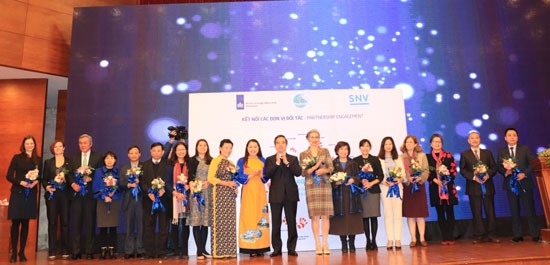 Society
Society

While the profile of Vietnamese businesswomen has been raised significantly in recent years with the emergence of leaders in certain sectors, budding women entrepreneurs still have to fight with one hand tied behind their backs.
 |
At the national platform on “Women Business Start-ups: Innovation and Connection,” speakers discussed challenges and opportunities as well as policy solutions to boost female entrepreneurship and promote gender equality in the business field.— Photo kinhtedothi.vn |
HÀ NỘI — While the profile of Vietnamese businesswomen has been raised significantly in recent years with the emergence of leaders in certain sectors, budding women entrepreneurs still have to fight with one hand tied behind their backs.
Experts and officials said at a meeting in Hà Nội on Deecember 14 that women still experienced very limited access to credit and technology despite contributing significantly to national growth.
At the national platform on “Women Business Start-ups: Innovation and Connection,” speakers discussed challenges and opportunities as well as policy solutions to boost female entrepreneurship and promote gender equality in the business field.
The platform was organised by the Việt Nam Women’s Union (VWU) and the SNV Netherlands Development Organisation.
Nguyễn Văn Bình, chairman of the Party Central Committee’s Commission for Economic Affairs, stressed the importance role women have to play in boosting business start-ups in the country.
Women-led enterprises and households have greatly contributed to economic development, been a significant income source and created millions of jobs, he said.
“More and more Vietnamese women entrepreneurs have been ranked among the most powerful women in Asia by prestigious international organisations,” Bình said.
But other speakers said women faced major challenges including gender norms, limited access to resources and markets because of insufficient collateral as well as lack of skills and knowledge of corporate governance, finance and marketing.
Nguyễn Thị Thu Hà, VWU chairwoman, said “The proportion of women-led large enterprises has gradually decreased, accounting for 19.8 per cent, and the number of women-led science and technology businesses is still limited.
“In addition, the percentage of female start-ups with more than three people is just 5.5 per cent, compared to 15.7 per cent for men,” she said.
While the Government has promulgated numerous incentive policies to support women in business, implementation has been weak and lacked necessary guidance, Hà said.
Delegates agreed that the platform was a good place for line ministries and aspiring female entrepreneurs to exchange knowledge and experiences, especially in terms of difficulties and obstacles in production and business and related policies, mechanisms and transactions with State management agencies from national to local levels.
The platform also marked the official kick-off of the National Women-led Business Start-up Programme, which will be implemented by the VWU between 2017 and 2025.
The programme aims to boost women entrepreneurship and innovation in all 63 provinces and cities in the country.
It will enable the VWU to strengthen its bridging role in supporting start-ups by women and encouraging their development, especially in agriculture and other areas linked to climate change adaptation, the meeting heard.
Success story
One of the businesswomen attending the meeting was Nguyễn Thị Hà, who expressed pride and happiness in helping many women earn stable incomes, either from their farms or through regular jobs with consolidated farms.
Hà, who is director of the Thành Hưng Agricultural Service and Integrated Business Co-operative in Thành Hưng Commune, Thạch Thành District in the central province of Thanh Hóa, said they have received active support from local authorities and high commitment from its members to function as an effective economic model.
This has helped Thành Hưng become just one of five communes in the district be recognised as new-style rural commune, she said.
The Thành Hưng co-operative was founded in September 2014. With seed funding from the Việt Nam Women’s Union that was invested in high capacity tractors, and contributions from 33 members of whom six are ethnic minority women, the co-operative has taken big strides forward, Hà said.
“The co-operative prioritises the timely provision of land preparation services and other inputs including pesticides and rice seedlings to members at favourable prices,” she said.
It also offers extension services and annually leases 200ha of land to farmers.
Constant attention by the board of directors to the needs of members was the key factor in the co-operative’s success, Hà said.
The co-operative has also created jobs for 15 women by connecting them with other large-scale agricultural farms in the commune.
“Thus co-operative members are highly motivated to contribute,” she said.
Building on its initial success, the co-operative is now developing the Hy Thiêm herbal production area, complying with good agricultural practices (GAP).
“Development of the herbal production area is an innovative initiative and expected to bring sustainable economic development for members,” Hà said.
Due to all of the aforementioned efforts, co-operative members have stable annual incomes of VNĐ50-70 million (US$2,200-3,100). — VNS




